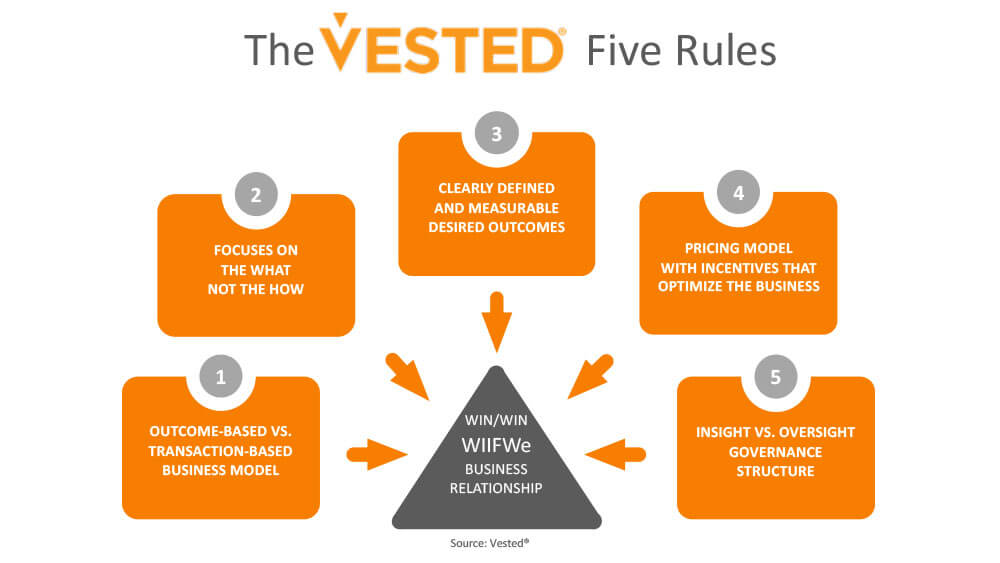
“It’s the lack of flexibility in our contracts and our lack of willingness to follow social norms in the relational piece that actually pits the planner and the supplier against each other,” said Kate Vitasek, who will speak at Convening Leaders 2021.
When planners and suppliers in the business events industry take a solutions-focused approach to their relationships, they will both benefit, said Kate Vitasek, principal of Vested Outsourcing and an expert on collaborative business relationships. If they don’t, especially in the difficult environment created by the COVID-19 pandemic, they will endanger the industry’s recovery.
“It’s like the old Wynonna Judd song, ‘When you hit rock bottom, you’ve got two ways to go — straight up and sideways.’ I think COVID-19 has hit your industry at rock bottom,” Vitasek told Convene. “Now the players,” she said, adding a hopeful note, “are willing to change.”
Vitasek, an author, researcher, and professor at the University of Tennessee, will speak at Convening Leaders 2021 on Jan. 13 and 14, to help both planners and suppliers understand how they can benefit from building partnerships by sharing risk and reward. She gave Convene a preview of her presentation titled “Five Rules that Will Transform Your Business Relationships.”

The Vested Five Rules are a framework to help the businesses create successful partnerships.
You’ve written six books based on the Vested Business Model. What will you focus on at Convening Leaders?
I’m going to talk about the five rules of how you transform business relationships. These are five simple rules that any player — a hotel, an event planner, a speakers bureau — can apply to make their relationships better. How can they rebuild their relationships that may have become heated during the pandemic crisis? We’ll start with the foundations of the relationships — going from adversarial to a formal relational contract that creates shared risks and rewards.
Could you explain the idea of formal relational contracts and how the five rules work?
Think of the relational contract as the umbrella and there are five rules in that umbrella. When you look at transactional contracts, negotiating is all about the and the price, instead of what are you are trying to accomplish. In the best relationships, negotiations start with the outcomes. Before they ever think about the meal and the price, the hotel room and the price, they ask, “What are the end games or outcomes that we’re trying to accomplish?” They create a boundary-spanning, shared vision and some guiding principles.
Let’s think about it this way: Meeting planners probably work with Marriott a lot. So why would I negotiate a one-off [contract] for this main event, then another for this event, and this event, and this event, when I may have 30 events that use Marriott? Let’s … think about, “Gosh, Marriott, I come to you all the time for every single event. What’s our goal together? Do we have a common goal, some objective?”
With that in mind, we would write what we call guiding principles. In our relational contract, we say, “We’re entering into this flexible contract relationship with Marriott where I’m going to bring you work. When I have an event, we’ll bring you work.”
The guiding principles are six social norms. Things like honesty — I’m going to be transparent with you and share with you things that you need to know. I’m going to be fair about the economics, so if an event gets canceled we need to figure out how to share risk and share reward on it. We’re going to agree on guiding principles, or behaviors, that we would look at before we ever get to the details of the price. What’s our partnership? The goal of our partnership and our behaviors or social norms? So that’s rule one, outcomes versus transactions.
Rule 2 “focuses on the what, not the how.” What does this mean?
Here, instead of the planner dictating to Marriott all the details of what that contract should look like, the planner considers Marriott the expert and works with them on options. Let’s say in a traditional contract they have a scope of work and it’s very detailed and the buyer is always untrusting of the supplier. So they put in things that kind of get to the how — I want this and this and this and this. It’s usually very prescriptive because there is not a lot of trust. In the best relationships, what we find is actually the supplier — Marriott in this case — is the expert. If they can understand what you’re trying to accomplish, they can be more flexible.
Do these five rules come in at the start of the contract, and then you get into specifics of meal pricing and discussions like that later?
That’s a good question. Rules 1 and 5 become the anchors. Rules 2, 3, and 4 are the guts. So what happens is now that I’m going to have 30 different events at the Marriott, I’m going to allow myself all this flexibility. I can actually have a little schedule or a statement of work underneath each event. I’m going to contract for the relationship [over all the events], and then I’m going to put some of the specifics underneath it. But I’m not going to get too specific, because I want to have flexibility. It’s the lack of flexibility in our contracts and our lack of willingness to follow social norms in the relational piece that actually pits the planner and the supplier against each other.
Let’s move on to Rule 3 — clearly defined and measurable outcomes.
How do we measure success? I imagine in business events, success is very transactional — you’ll book 1,000 people in my hotel — versus is it the goal-based approach to say, “Wow, people love this event and want to come back to this event so we’re bringing more events to you and to your hotel.” Many times we’re measuring the very transactional, tactical aspects versus the bigger picture that actually drives the feature.
Related: We’re in This Together: ‘Sharing Risk in Highly Uncertain Times’
That leads into Rule 4, which is the money. We’re going to share success, share risks, share rewards, because the more successful my events, the more profit I have and I’m going to share that.
Think about virtual events. I saw something just the other day about an association that used to get 3,500 people at its event. This year they did a virtual event because of the pandemic, and it was global. They had 30,000 people at the virtual event. I bet the hotels and the convention center where the physical event was to have taken place got nothing. But yet the association had 30,000 people attend virtually.
So the association won and those suppliers lost. How do we actually bring them in so that they can begin to at least win something? Bring in their IT people. If we did really well on the event, why can’t I take some of that money and then prepay for rooms for next year’s event so now the hotel at least isn’t going bankrupt? I’m committed because you’re my partner. I made some money without you this time. Let me go ahead and pre-pay you for next year.
For Vested relationships to work in our industry, do we need to blow up our ideas about contracts?
What’s interesting is your industry is very dynamic in the first place, and so you have created these rigid contracts, which create friction anyway. The industry had this pent-up negative energy, and it just came to a crashing halt with COVID. Now I think it’s the perfect storm, because why can’t we rethink these relationships that are more flexible because, for goodness sakes, your industry needs flexibility.
Which then takes me to Rule 5, which is insight versus oversight governance and how we govern the relationship and the partnership and the mechanisms. So if planning is what we’re trying to do, I’m going to bring in the Marriott person — an expert — on my team to help plan my event, instead of saying I’m the planner, I’ll tell you what needs to be done. They can help us by bringing their expertise. If we bring in other people they can help come up with these kinds of ideas.
How do you get business people to buy into this idea that seems such a departure, sort of “touchy-feely” almost — even for the business events industry, which is based on relationships?
We hear this all the time. I’ll give you a real example from Dell and FedEx. If your computer broke, it actually went to FedEx reverse logistics, and they repaired your computer behind the scenes. About $40 million a year passed hands between Dell and FedEx to do reverse logistics. They were very transactional. The procurement policy was such that Dell every year bid it out. It was just this transactional bid — you’re my vendor, you’re not my partner.
It created a real animosity and was frustrating for both Dell and FedEx. So they had a two-day offsite to say, “Why are we bickering over this? There’s a bigger picture here. There’s a much better picture.”
When people say these ideas are “fluffy,” we can point to all kinds of research — economic research, sociology research, supply chain research — that absolutely proves that when you consciously choose to cooperate and pledge to have true win-win economics, you win together, you lose together, and you have the best chance of optimizing. When people get stuck and they pause to listen and learn, they actually realize what we teach isn’t fluffy, it is, to use Dell’s words, “radical common sense.”
There seem to be a lot of opportunities in business events for people to be more collaborative and aligned in their negotiations and partnerships. Where should they start?
If I had to give advice, I’d say start to change the world one deal at a time, one relationship at a time. You have so many suppliers in your industry, so have a conversation with one you think is your most critical strategic supplier and change the way you work with them. Then go to the next one, and then go to the next one.
How do you get that conversation started?
Don’t start by pulling out that force majeure clause like you did this summer. Often if you’re in a bad adversarial space, start with a mia culpa, put out an olive branch and say, “This hasn’t been fun for me. It’s not fun for you.” Walk through the rules, one rule at a time, and co-create instead of negotiate. Co-create the rules of your partnership.
If you have aligned interests, and winning together and losing together, there is no negotiation. You only start negotiating when you want to win at someone else’s expense. When we accept the fact that our best odds are shared risk and shared reward, we win together, we lose together.
Curt Wagner is digital editor at Convene.
This interview has been edited for space and clarity.

